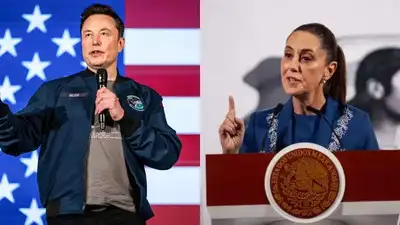In a rare diplomatic standoff, Mexican President Claudia Sheinbaum announced on June 25, 2025, that her administration is preparing to take legal action against SpaceX after debris from a Starship rocket test landed on Mexican soil. The announcement came during Sheinbaum’s morning press conference, where she confirmed that environmental officials had documented contamination along the coast of Tamaulipas and that “there is indeed contamination” that may violate international law apnews.comtheguardian.com.
Explosion Triggers Diplomatic Rift
On June 18, SpaceX conducted a ground test of its Starship rocket at the Starbase facility in South Texas, close to the U.S.–Mexico border. The test ended in a dramatic explosion that sent metal, plastic, and branded rocket fragments flying across the Rio Grande into Mexico’s Tamaulipas state. Officials collected debris on June 21 and began a survey of more than 40 kilometers of coastline to assess the fallout apnews.com.
Contamination Reported Along Tamaulipas Coast
Mexican environmental prosecutors and federal agency staff have documented scattered shards of plastic, rubber, and metal stamped with SpaceX logos. These materials pose risks to local wildlife and fishing communities. President Sheinbaum stressed that her government has launched “a general review” to determine which international treaties or environmental protocols SpaceX may have breached. She added that once the inquiry concludes, Mexico will file the “necessary lawsuits” apnews.com.
International Laws Under Review
Mexico plans to explore its options under international environmental conventions and bilateral agreements. While no formal suit has been filed, Sheinbaum made it clear that legal proceedings are imminent if the review confirms violations. Tamaulipas Governor Américo Villarreal also demanded an evaluation of SpaceX’s compliance with regulations governing the location of large launch sites relative to populated areas apnews.com.
Pattern of Cross-Border Incidents
This is not the first time SpaceX debris has reached Mexican territory. Following a May 27 test flight, fragments from a Super Heavy booster washed ashore days later, prompting local crews to clear contaminated beaches. Critics have long warned that expanding launch schedules—recently approved by the U.S. Federal Aviation Administration to increase annual Starship tests from five to 25—could heighten risks for cross-border pollution and wildlife habitat disruption theguardian.com.
Tensions Among Tech Giants
The spat adds to a growing list of disputes between Mexico and U.S. technology firms. In May, Sheinbaum’s government filed suit against Google for renaming the “Gulf of Mexico” to the “Gulf of America” in U.S. map versions. These actions signal Mexico’s determination to defend its environmental sovereignty and geographic identity in the face of powerful multinational players.
Short Analysis
In my view, Mexico’s swift move highlights a new era of accountability for private space ventures. While SpaceX pushes the boundaries of exploration, it must also manage the local fallout of its tests. Balancing innovation with environmental stewardship will define the next chapter of international space cooperation.

